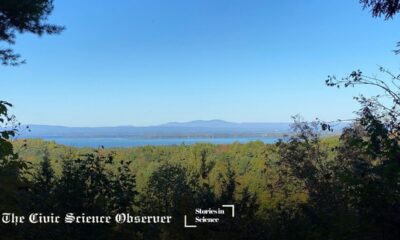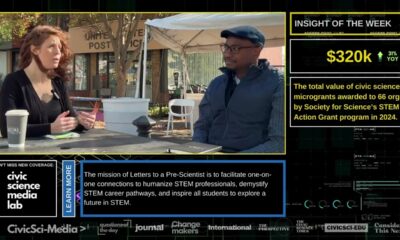Stories in Science Special Series
Perseverance to Passion
In my life, perseverance is growing up in the inner city of Flint, Michigan. Gangs, violence, and drugs were part of everyday life. I’ve seen someone being run down by a car, shot in the head, and been shot at myself, just to name a few. These were my early teenage years. I was a bright kid but did not want to do the work.

Alan A. Arnold, Ph.D.
[dropcap]M[/dropcap]y story is the embodiment of taking perseverance and turning it into passion. What is perseverance? Perseverance is steadfastness in doing something despite the difficulty. To persevere is to persist in a state or undertaking in spite of counter-influences, opposition or discouragement. In my life, perseverance is growing up in the inner city of Flint, Michigan. Gangs, violence, and drugs were a part of everyday life. I’ve seen someone being run down by a car, shot in the head, and been shot at myself, just to name a few. Those encounters were typical of my early teenage years. I was a bright kid but did not want to do the work. As a sophomore in high school, my cumulative grade point average dropped to lower than a 2.0.
… one of my professors told me “I was not a serious student… you can’t become a doctor… that’s a pipe-dream…”
My parents had instilled in their children the importance of education. However, with my mother passing when I was nine years old and my father suffering from mental illnesses as a result of the Korean War, it was easy to “not listen” to my parents. But what they told me was always in my mind. As a high school student, you don’t know what lies ahead and one of my brothers saw that I was headed down the wrong path.
He was an undergraduate student at an engineering school, majoring in electrical engineering. I did not understand what an undertaking it was to bring me in and take care me. He took me under his wing to change my potential trajectory. He showed me positive study habits and had me think about life in a different manner. Using my brother as a role model, I was able to change my grades dramatically from below 2.0 to nearly a 4.0 at graduation.
Perseverance continued during college. The transition from inner-city high school student to the university level was an eye-opening experience. I excelled at Flint Northern High school, maintaining a 4.0 during my final two years. However, I quickly realized that an excellent academic record at a struggling inner-city school did not translate to preparation for collegiate learning. Mathematics was an uphill battle. Moreover, one of my professors told me “I was not a serious student… you can’t become a doctor… that’s a pipe-dream…”. The backdrop of this small biochemistry class was that I was the only African American in the course and the only one in the Biotechnology degree program during my entire tenure at the school. Her comments were motivation to become a doctor.
During my junior year of undergrad, my aunt passed away from leukemia followed shortly after by my father with multiple myeloma. One of the toughest parts of my father’s death is that I knew he would die soon. During his treatments, I was taking medical microbiology and learned about Pseudomonas Aeruginosa. My father’s prognosis tracked precisely as the textbook described. Additionally, the physician told my brother and I there was not enough research to change the outcome of our father’s illness. These tragedies persuaded me to focus on research to learn more about cancer.
I also taught science while living in China. The undergraduate Chinese students said, “Dr. Arnold, you are making science fun… You are different from our Chinese teachers; you ask us questions…”
Perseverance in graduate school? Yep. At this point in life, I had built up some calluses for negative comments. During my Ph.D. my peers told me “you’re not a serious student… you can’t graduate in four years…” They did not know that I was in the laboratory by 6 a.m. and by the time they arrived, I had completed my experiments. Furthermore, I was writing small pieces of my dissertation every day. The backdrop to this cancer biology program is that again I was the only African American male. There was only one other female African American. However, four years later, I graduated with my Ph.D. in cancer biology.
Perseverance during a postdoctoral fellowship? Yep. Here I thought that we were all doctors, it should be fine. I was 27, and my co-workers were in their early 30s. Our lifestyles were different, but that didn’t matter to me. But again, more of the same. “You’re not a serious scientist… You didn’t work for that training grant…” The sentiment was the same with the senior technicians. Again, being the only African American in the division. During my post-doctoral fellowship, I started posing questions to myself.
Was research my passion? What would have happened to me if I didn’t have positive role models at each stage of my educational training? How can I help those who need a positive role model in the face of adverse sentiments?
Passion is a strong and barely controllable emotion. What was my passion? Mentoring and education have been the cornerstone of my career and life. My passion is helping others with knowledge. It was now time to turn my perseverance into a passion.
What did passion sound like? As an instructor at City College of New York, I taught GED and computer literacy courses and the students told me “Thank you for teaching us… Thank you for being patient… I am so glad I learned from you, you took the time to actually to listen to me…” I also taught science while living in China. The undergraduate Chinese students said, “Dr. Arnold, you are making science fun… You are different from our Chinese teachers; you ask us questions…” These comments were in stark contrast to those I received during the “perseverance” years.
At that stage in my life, I started to think about what my mission was in life. I wanted to help promote scientific literacy and critical thinking skills for individuals from disadvantaged backgrounds. Develop policies that provide resources for underrepresented minorities to have better access to STEM education and to promote career growth and opportunities. How could I accomplish my mission? I learned of the American Association for the Advancement of Science (AAAS) Science and Technology Policy Fellowship from a friend who knew of my mission and passion.
Now as a AAAS Science and Technology Policy Fellow, I am turning my passion into my vocation by helping to channel and facilitate opportunities for people to voice their concerns, and thereby begin the process of enacting meaningful changes that genuinely address diversity and inclusion. I have been able to facilitate communication with underserved communities, broadened their participation, and increased inclusivity within governmental programs. Moreover, I am writing a book on professional networking. I feel this is a way to give those who may have a little perseverance, but need a little more to get to their passion and mission in life. My mission is to continue to be an advocate for those who are in need.
If you ask me, “What is your story?” My story is turning Perseverance into Passion.
Learn more about Dr. Alan Arnold.
Cover image is by Patrick Neufelder on Pixabay | CC0 Creative Commons
Metrics
Sessions
Total number of Sessions. A session is the period time a user is actively engaged with the page.
Visitors
Users that have had at least one session within the selected date range. Includes both new and returning users.
Page views
Pageviews is the total number of time the article was viewed. Repeated views are counted.
The CS Media Lab is a Boston-anchored civic science news collective with local, national and global coverage on TV, digital print, and radio through CivicSciTV, CivicSciTimes, and CivicSciRadio. Programs include Questions of the Day, Changemakers, QuickTake, Consider This Next, Stories in Science, Sai Resident Collective and more.

-
Audio Studio1 month ago
“Reading it opened up a whole new world.” Kim Steele on building her company ‘Documentaries Don’t Work’
-
 Civic Science Observer1 week ago
Civic Science Observer1 week ago‘Science policy’ Google searches spiked in 2025. What does that mean?
-
Civic Science Observer1 month ago
Our developing civic science photojournalism experiment: Photos from 2025
-
Civic Science Observer1 month ago
Together again: Day 1 of the 2025 ASTC conference in black and white
Contact
Menu
Designed with WordPress

























